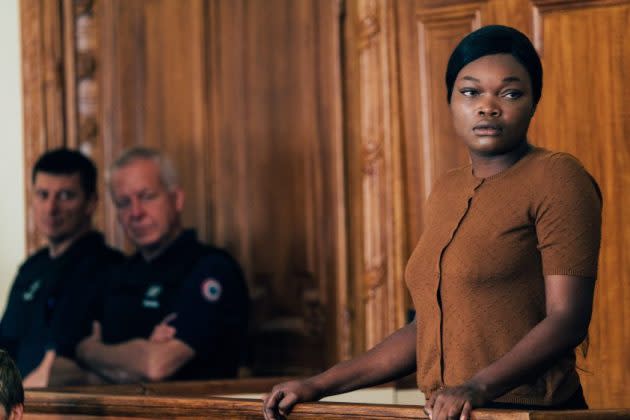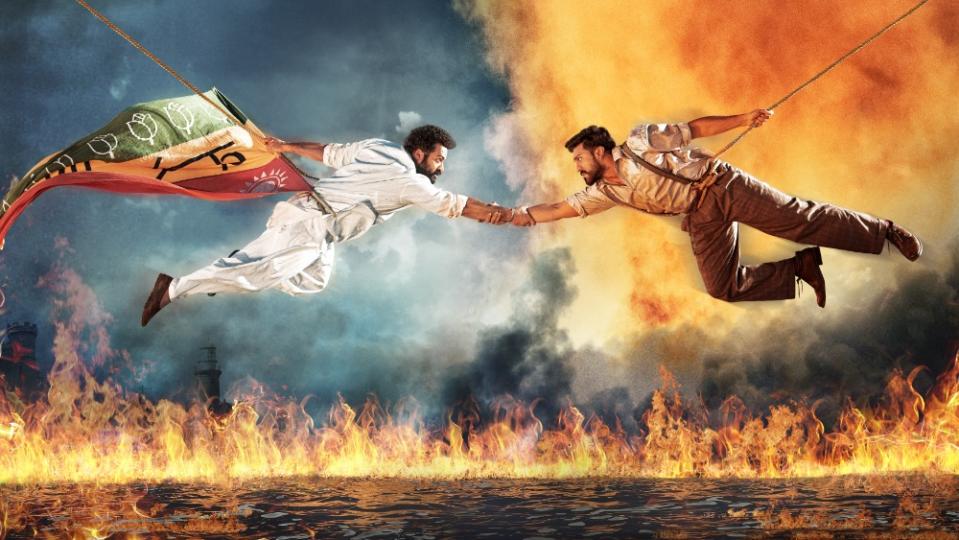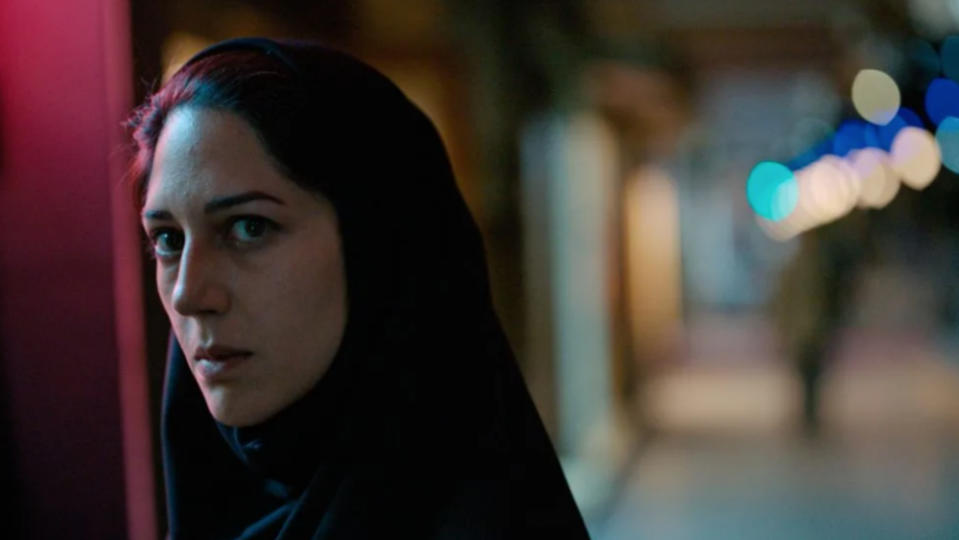United Nations? Far From It. Why There’s No Shortage of Drama in the International Oscar Race
- Oops!Something went wrong.Please try again later.

The international feature film race has always been a minefield for international politics and a vehicle for soft power. With no shortage of drama, scandal and diva antics, it’s basically the Eurovision of the film biz.
But in recent years, as international contenders have become more powerful following “Parasite’s” boundary-breaking best picture win, this particular Oscar race has invited more scrutiny than ever. The decisions of national film committees are keenly observed, analyzed, debated and even contested. And what many consider the most deserving film doesn’t always make the cut.
More from Variety
South Indian Cinema Rules as Bollywood Battles Box Office Blues
Why Foreign-Language Films Still Struggle to Get U.S. Oscar Voters' Attention
Besides setting submission deadlines and green-lighting selection committees, the Academy of Motion Picture Arts and Sciences is fairly hands off, and its criteria straightforward: A country’s entry has to be in any language but English (which is why Ruben Östlund’s Palme d’Or-winning “Triangle of Sadness” wasn’t submitted by Sweden); a U.S. theatrical distributor isn’t necessary; a submitted film can be solely a digital/home entertainment release; and financing can come from any source.
These guidelines, however, haven’t prevented some countries from over-politicizing the process and making baffling decisions that seem out of touch. Of course, local committees aren’t entirely to blame: Trying to guess what a U.S. voter base that constitutes roughly 75% of the Academy might vote for can feel as random as predicting winning lottery numbers. In this awards special, Variety examines the Oscar selection process in an array of international markets to see what works, what’s broken and what needs fixing.
France: Politicking Gets the Better of the Industry
Despite being over-represented in competition lineups at major festivals like Cannes and Venice, France has had a cursed track record in the international feature film race, and has been overshadowed by smaller countries like Denmark in recent years.
The French haven’t been able to claim an Oscar victory in the category since 1993 with Regis Wargnier’s win for “Indochine.” In the past 15 years, only four French films submitted have landed a nomination: Ladj Ly’s “Les Miserables” in 2020, Deniz Gamze Ergüven’s Turkish-language film “Mustang” in 2016, Jacques Audiard’s “A Prophet” starring Tahar Rahim in 2010 and Laurent Cantet’s Palme d’Or-winning “The Class” in 2008.
Ironically, some French-language films repping other countries in the international feature race have been more successful, such as Michael Haneke’s “Amour,” which was submitted by Austria in 2013 and won. In the upcoming race, France is vying for a nomination with Alice Diop’s Venice Golden Lion-winning “Saint Omer,” a politically minded feature debut based on the real-life trial of Fabienne Kabou, a Senegalese immigrant accused of murdering her 15-month-old baby.
This year’s Oscar committee, which included the likes of Audiard (“A Prophet”), Philippe Rousselet (“CODA”) and Hengameh Panahi (“Persepolis”), was bitterly split between “Saint Omer,” acquired by Neon’s Super label after Toronto, and “One Fine Morning,” Mia Hansen-Løve’s romance drama starring Lea Seydoux, which was picked up by Sony Pictures Classics in Cannes. The heated deliberations ended with a vote, as it almost always does.
“France has always been difficult because you have an embarrassment of riches,” says Michael Barker at Sony Pictures Classics who, like most U.S. distributors of shortlisted films, made a case for “One Fine Morning” in a detailed presentation streamed before French Oscar committee members. “I like this idea of having one film from one country, but what it does in countries like France is deny quality films the opportunity to be part of the Oscar system,” Barker continues.
The Oscar committee in France has been a work in progress since 2019. After opening the committee to industry professionals such as producers and sales agents, the CNC also changed the deadline for submitting films so that movies that world premiere at fall festivals — such as Venice — could also be considered. (The previous deadline favored films that opened at Cannes in May.)
When Audrey Diwan’s Venice Golden Lion winner “Happening,” a searing abortion drama, was overlooked in 2021 by France’s Oscar committee in favour of Julia Ducournau’s Palme d’Or-winning “Titane,” it sparked an uproar. Particularly as the latter film didn’t even make the international Oscar shortlist.
“Sometimes, politics gets in the way of having an actual conversation based on merit,” says Arianna Bocco at IFC Films, who flew to Paris with FilmNation’s Glen Basner to present their joint distribution and campaign plans for “Happening.”
“The politicking that went on was disheartening,” reflects Bocco.
The “Happening” scandal also raised potential conflicts of interest within the committee, leading to further changes put in place by the CNC this year. The current committee has been stripped of permanent members such as Cannes Film Festival chief Thierry Fremaux and Unifrance president Serge Toubiana (who can’t vote but attends meetings).

India: ‘Total Lack of Transparency’ in the Process
India scored an Oscar nomination with its very first submission to the then-foreign language category with “Mother India” (1957) and since then, despite entering every year except 2003, has had two nominations — “Salaam Bombay” (1988) and “Lagaan” (2001) — with no wins. Submissions are managed by the Film Federation of India (FFI).
The one year India was thought to be in with a real shot was Ritesh Batra’s “The Lunchbox,” which debuted at Cannes in 2013, won an award at Critics’ Week and secured U.S. distribution with Sony Pictures Classics. That year, the FFI chose competent but little-known road movie, Gyan Correa’s “The Good Road,” as India’s entry, generating a massive controversy.
The issue appears to be that of transparency with details of the members of the Oscar committee, or the list of films that have been sent to the FFI for consideration, not readily accessible.
Filmmaker Anurag Kashyap, one of the producers of “The Lunchbox,” told Variety: “What we need in India is more transparency, as in who are the people in the committee who select it? There has to be a policy in place. They can’t be the same people every year, because then it’s easy for anyone to point a finger and say that your methods are all wrong.”
Controversy arose again this year with S.S. Rajamouli’s dazzling period blockbuster “RRR” being passed over in favor of AMPAS directors’ branch member Pan Nalin’s ode to celluloid “Last Film Show,” which began its journey at Tribeca. After the initial furore about the “RRR” non-selection, matters cooled down, with the film’s team deciding to mount an Oscar campaign across major categories. Meanwhile, the cream of Bollywood, including superstars Amitabh Bachchan and Salman Khan, and filmmaker Karan Johar, publicly threw their weight behind “Last Film Show.”
“It was very clearly known that ‘RRR’ was most likely to win this year and a lot of us, whether we liked the film or not, were rooting for it because it helps Indian cinema in general,” says Kashyap. “But we end up making choices sometimes…Because there’s total lack of transparency in the process, we don’t know who the selection committee is.”
The director continues: “‘Last Film Show’ has an international appeal, and [Nalin has] also become a member of the Academy, but people aren’t very aware of the film.”
Italy: Best Film or Best Chance of Winning?
Italy has won the most international feature Oscars of any country, with 11 wins and three special awards, but the tide has shifted in recent years.
Since 2006, Cinema Italiano has earned just three Oscar nominations, the most recent of which was in 2021 with “The Hand of God” by Paolo Sorrentino, who in 2013 scooped the statuette with “The Great Beauty.”
Part of the problem, says film critic Paolo Mereghetti of Italian newspaper Corriere della Sera, lies in the selection criteria adopted by the commissions picked by Italian motion picture association ANICA each year to select the country’s Oscar candidate.
“I wonder whether sometimes choices are made by members of the commission just to please a director or a producer,” says the prominent Italian critic, noting that this only has a counterproductive effect.
This year, Mereghetti was perplexed when he heard that the commission had chosen Mario Martone’s “Nostalgia,” a film he personally likes, but doubts was the right choice.
“On the one hand I was delighted for Martone and the film, which I think is very high quality cinema,” he says. “But I wondered – based on the film’s reception in Cannes – whether it can resonate with the sensibility of a U.S. audience,” Mereghetti adds.
“Nostalgia” stars Pierfrancesco Favino as the middle-aged Felice Lasco, a Neapolitan native who returns to the bustling port city after having lived in Egypt for 40 years.
“Nostalgia” emerged as Italy’s Oscar candidate from a clutch of 12 titles, beating Emanuele Crialese’s Penelope Cruz-starrer “L’Immensità” and Belgian directors Felix van Groeningen and Charlotte Vandermeersch’s Italian-language drama “The Eight Mountains,” which were considered the other frontrunners.
However, though “Eight Mountains” is produced by an Italian company, Wildside, it’s directed by two non-Italians. “Perhaps the commission felt that this would not have been the right choice,” says Mereghetti, even though there are several instances of countries selecting films with directors of a completely different nationality.
“Eight Mountains” will go out in the U.S. via Janus Films and Sideshow, which released last year’s international Oscar winner “Drive My Car.”
Breaking Glass Pictures has acquired North American rights to “Nostalgia.”
If picking “Nostalgia” raised eyebrows this year, Italy’s 2021 Oscar candidate, Gianfranco Rosi’s observational doc “Notturno,” came as an even greater surprise.
“I was astonished,” recalls Mereghetti, who is a big fan of “Notturno” but notes that there were two stronger candidates last year: Matteo Garrone’s “Pinocchio” and Sophia Loren-starrer “The Life Ahead.”
“When Italy chooses a film for Oscar consideration, they shouldn’t select the entry they consider to be the best overall film. They have to propose the film that has the best chances of winning,” says Mereghetti.

Holy Headaches: Troubled Systems Pervade
Boasting a small but well-subsidized film industry, Denmark has had an impressive run in the international feature film race. Since director Susanne Bier won the prize in 2010 with her drama “In a Better World,” the country picked up another international Oscar in 2020 with Thomas Vinterberg’s “Drunk,” and has been nominated five times and shortlisted twice. This year’s Danish entry, Ali Abbasi’s “Holy Spider,” a Farsi-language serial killer thriller from Iran, is among the favorites.
The structure of the Danish Oscar committee hasn’t much changed in years. It’s still chaired by Claus Ladegaard, CEO of the Danish Film Institute, and includes a total of eight people, two of whom come from the Danish Film Institute, and six annually rotating members from different guilds, ranging from producers to exhibitors to critics.
Ladegaard says the committee doesn’t go for the “best quality” movie, but rather “the film that stands the best chances of winning the Oscar.” This year, that pic was “Holy Spider.”
“It’s a film in Persian language and it’s about Iran but it’s coming out of Denmark and it has a Danish tradition of storytelling and Danish values,” Ladegaard continues. He says the political timeliness of the film was also taken into consideration, although it’s “tough to figure out” if that’s what voters look for. “Last time we won was with ‘In a Better World’ which was not a political film, but a local movie about revenge,” Ladegaard says. But the executive predicts that “the inclusion of more women and people of color within the AMPAS membership” might make the category “more political.”
Elsewhere, Egypt, Nigeria and Iran represent interesting examples of contrasting decision-making made by various national film bodies.
Egypt is historically the MENA region’s film industry powerhouse, but has never managed to clinch a single nomination. This year, the country decided not to participate in the Oscar race at all. The Egyptian pic that would have had the best Oscar chances is the social satire “Feathers,” directed by first-time director Omar El Zohairy. “Feathers” scooped the top prize at the 2021 Cannes Critics’ Week but subsequently ruffled feathers at the El Gouna fest in Egypt, and hasn’t yet been released in cinemas.
Elsewhere in Africa, the Nigerian film industry is up in arms over the selection committee’s decision not to submit a single film to the Oscars, despite three films, including the Toronto-premiering “The King’s Horseman,” qualifying to represent the country. Variety understands that AMPAS is now involved, and is expected to make a decision on whether or not to uphold the move.
Meanwhile, in Iran – where the government is busy quashing an internal revolt – the country picked the anti-totalitarian political drama “World War III” by prolific young director Houman Seyedi as its candidate. The film, which won two prizes in Venice, is a political metaphor in which a homeless day laborer on a construction site gets hired to work as an extra on a WWII movie. Unsurprisingly, incarcerated director Jafar Panahi’s “No Bears,” which won the Special Jury Prize at Venice, was not among the candidates.
With the commercial prospects for foreign movies in the U.S. shrinking, the international Oscar submissions process has become increasingly crucial for American distributors who view it as a make-or-break factor. “To be nominated for the Oscar or to be on the shortlist for the Oscar gives a profile and lifeline to these movies that are very important to film culture,” says Sony Pictures Classics’ Michael Barker.
Yet, looking at the extent of behind-the-scene drama, entangled interests and missed opportunities, it’s clear the system is flawed. Given such headaches, it’s tempting to consider a U.S.-led selection process in which Americans select the Oscar entries, or perhaps choose only the top films from major festivals. But such “solutions” would only go against the essence of the international feature film community. After all, the complications tied to the process of letting nations battle it out for a sole candidate often reflects each country’s DNA. And the unpredictability of these submissions is also the secret ingredient that allows hidden gems to be discovered every year.
Manori Ravindran contributed to this report.
Best of Variety
Oscars Predictions: Best Sound - Can Anything Take Down the Aural Designs of ‘Top Gun: Maverick?'
Toni Collette Turns 50: Her 12 Best Film Performances, From ‘Hereditary’ to ‘The Sixth Sense’
Sign up for Variety’s Newsletter. For the latest news, follow us on Facebook, Twitter, and Instagram.

